John Janaro's Blog, page 4
August 9, 2025
Nagasaki, Edith Stein, and Prayer for Peace
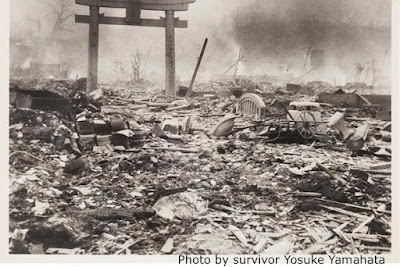 We remember many persons and many moments is these dramatic days of August. We mourn the past with an unconditional sorrow, while we also recognize in these events (in pictures like these) that our world continues to hold and put its trust in vast and even greater powers for destruction. We have lost connection with reality if we think that we can somehow “balance” these powers by our own cleverness, or by making “deals” while ignoring the precariousness of the future and the seriousness of what is at stake. We are not playing cards. This is not a game.
We remember many persons and many moments is these dramatic days of August. We mourn the past with an unconditional sorrow, while we also recognize in these events (in pictures like these) that our world continues to hold and put its trust in vast and even greater powers for destruction. We have lost connection with reality if we think that we can somehow “balance” these powers by our own cleverness, or by making “deals” while ignoring the precariousness of the future and the seriousness of what is at stake. We are not playing cards. This is not a game.Today marks 80 years since the monstrous nuclear blast that indiscriminately wreaked and poisoned the city and the civilian population of Nagasaki in Japan. This was the second city that the USA afflicted with its new, horrible weapon of massive explosive power and unprecedented release of huge levels of deadly radiation. The bast killed tens of thousands in agony, and the radiation continued to kill and kill and sicken and wound and disfigure innocent civilians beyond anyone’s calculation.
The choice was made to drop these bombs without any idea what kind of damage they would do, how long it would last, and how many people would suffer. We still don’t know the whole awful story, much less the potential consequences of the various nuclear weapons we now hold, along with too many other nations, still pointing them at one another, still counting on a system of mutual threats to unleash unimaginable catastrophe on the world and presuming that everyone will be too scared to use them. This is what we call “peace” in the modern world.
Pope Saint John Paul II, Pope Benedict XVI, Pope Francis, and now Pope Leo XIV didn’t (and don’t) regard this as a “peace” worthy of an interconnected world of human persons created in the image of God.
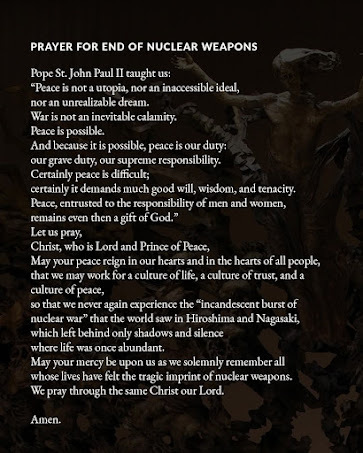 These words of John Paul II, and the prayer that accompanies them, are direct and powerful. Let’s ponder these words and pray this prayer. Let’s also pray the Rosary for peace, for conversion, for God’s mercy to empower us to live as brothers and sisters, and to reject the gluttony of consumerism and the sloth of indifference. May the Lord’s merciful love change our hearts and move us to embark on the arduous path of dialogue, willingness to forgive, to listen, to be patient, to be clear about our principles while distinguishing them from our prejudices, and to be willing to learn and grow from real encounters with other people. Hiroshima and Nagasaki are a warning to all of us that the only reasonable path is to work together to build real foundations for peace.
These words of John Paul II, and the prayer that accompanies them, are direct and powerful. Let’s ponder these words and pray this prayer. Let’s also pray the Rosary for peace, for conversion, for God’s mercy to empower us to live as brothers and sisters, and to reject the gluttony of consumerism and the sloth of indifference. May the Lord’s merciful love change our hearts and move us to embark on the arduous path of dialogue, willingness to forgive, to listen, to be patient, to be clear about our principles while distinguishing them from our prejudices, and to be willing to learn and grow from real encounters with other people. Hiroshima and Nagasaki are a warning to all of us that the only reasonable path is to work together to build real foundations for peace.If we feel that this is impossible; if we feel powerless in relation to the massive technological powers that we have unleashed and that are developing even now in new and incalculable ways, then we can still begin. We can pray. We can give our powerlessness to God, and allow Him to shape us anew according to His will, to learn the ways of His love and compassion.
August 9th is also the feast of Saint Teresa Benedicta of the Cross (Edith Stein) who was martyred in Auschwitz-Birkenau on August 9, 1942. She was a profound philosopher, born into Jewish heritage, then passing through atheism and arriving — by the grace of God — at faith in Jesus, conversion to His Catholic Church, and the vocation to give herself totally to God as a Carmelite nun. The Nazis still came for her, but all their power couldn’t rob from her the love of her heart.
Her words here are a constant inspiration to me: “Become like a child and lay your life, with all the searching and ruminating, into the Father’s hand” (Edith Stein).

August 8, 2025
Saint Dominic: The “Example of Humility”
August 8 is the feast of Saint Dominic. “Arm yourself with prayer rather than a sword; wear humility rather than fine clothes,” said Saint Dominic. Those who do not have faith “are converted by an example of humility and other virtues far more readily than by any external display or verbal battles.”

August 7, 2025
JJ's Quotations, Thoughts, and Aphorisms, No. 1
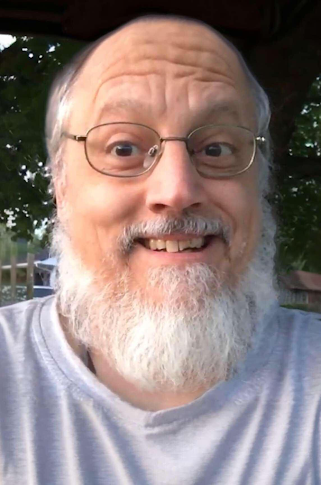 “I think of art, at its most significant, as a DEW line, a Distant Early Warning system that can always be relied on to tell the old culture what is beginning to happen to it” (Marshall McLuhan, Understanding Media, 1964).
“I think of art, at its most significant, as a DEW line, a Distant Early Warning system that can always be relied on to tell the old culture what is beginning to happen to it” (Marshall McLuhan, Understanding Media, 1964).Here is a quotation from one of the pioneers of modern "Media Studies," Marshall McLuhan. Right now, I am inclined to reflect generally on McLuhan and his methodology, rather than the content of this particular quotation (it's interesting, but I have to think more about it before writing).
We still have a lot to learn from Marshall McLuhan. The tweedy literature professor at the University of Toronto liked to examine how forms of media affect our perceptions. His 1964 book Understanding Media was written in an aphoristic style, which McLuhan found useful for "probing" new issues and provoking others to think about them. In his many years of teaching literature, McLuhan wrestled with the "problem" of "disconnection" between teachers and students growing up in mid-20th-century Anglo-America (many teachers would say that this is still a problem in 2025). He saw that the unprecedented rise of mass media was having a much deeper impact on the way students - and people in general - were perceiving and experiencing things, which tended to "shape" the environment and forms of their awareness, intellectual development, and communication. In articles and books published after World War II, McLuhan began to analyse and probe the impact of modern advertising (The Mechanical Bride, 1951) and electronic media in the context of the dominant "print culture" that had shaped the Western ways of learning since the revolutionary invention of the printing press in the 15th century (The Gutenberg Galaxy, 1961). He had a lot of fascinating insights about how media technology influenced historical developments in ways that were not much noted or studied at the time.
With Understanding Media, McLuhan dealt with the major cultural changes that were being fostered by "new media," especially the electronic audiovisual communications device that was finding its way into every living room in the affluent world and was becoming increasingly accessible everywhere on earth: Television. What Professor McLuhan didn't expect in 1964 was that his precient thoughts and his questioning and probing style would be taken up into the dramatic and wildly experimental decade that was emerging, and that his own persona would rise to celebrity status. By age 60, McLuhan had attained the status of a media guru, an "icon" of the TV age ("icon" is one of many terms he coined and/or repurposed specifically with reference to the social impact of media). But he remained focused on his work and "detached" from his ballooning image, except to treat it as another phenomenon to probe and question, while appreciating its ironic and humorous aspects.
McLuhan's emphasis on understanding the impact of media was an effort he undertook in order to cultivate a wisdom about the gains (and losses) of media technology for human ways of living, learning, and communicating - and how to foster a "media ecology" to focus on the primacy of the human person in new media environments. He didn't particularly invite all the attention he received (in fact he saw many grave dangers in emerging media) but his open analytical style and his awareness of the magnitude of the ongoing new media revolution gained the attention of a wide variety of personalities in the explosive and confusing cultural shifts of the late 1960s-1970s, up until his own illness and death in 1980.
Marshall McLuhan wanted to get people to think, because he was aware of the history of communications media (beginning with the fundamental developments of spoken and written language), and the influence of media on human perception, on how humans receive and process information, and on the formation of dominant cultural mentalities. Media "extend" the reach of our senses, changing the way we interact and communicate. This can enrich us in many ways, but it is also prone to "unbalancing" our natural sense integration and the construction of communicative "symbols," and thus potentially distorting our process of coming to know and engage reality in all of its factors.
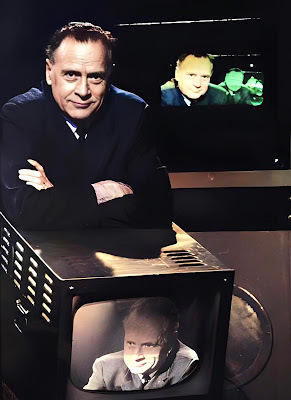 JJ could say many more things about Marshall McLuhan, but I want to introduce here a blogging approach that I call "Quotations, Thoughts, and Aphorisms," which is in part inspired by McLuhan's efforts to understand media. McLuhan recognized his own ignorance, a learned ignorance, and put forth many tentative statements (like the one quoted at the beginning of this long post, which I'm not going to consider further today) and questions that might awaken insight into the powerful developments of his times (and ours). I can no longer afford to wait until I have "thought everything through" (which seldom happens anyway) before expressing what's going on in my mind and in my studies. There is an urgent need to explore the impact on human society and culture of the emerging new forces of this ongoing tumultuous epochal transition we are experiencing in various ways all over the world. So I embark here on another broad categorical literary experiment in my blogging efforts. The QTA segment may or may not become a "future feature" on the blog. Let's see what happens.
JJ could say many more things about Marshall McLuhan, but I want to introduce here a blogging approach that I call "Quotations, Thoughts, and Aphorisms," which is in part inspired by McLuhan's efforts to understand media. McLuhan recognized his own ignorance, a learned ignorance, and put forth many tentative statements (like the one quoted at the beginning of this long post, which I'm not going to consider further today) and questions that might awaken insight into the powerful developments of his times (and ours). I can no longer afford to wait until I have "thought everything through" (which seldom happens anyway) before expressing what's going on in my mind and in my studies. There is an urgent need to explore the impact on human society and culture of the emerging new forces of this ongoing tumultuous epochal transition we are experiencing in various ways all over the world. So I embark here on another broad categorical literary experiment in my blogging efforts. The QTA segment may or may not become a "future feature" on the blog. Let's see what happens.One mode of exploration begins (but doesn't necessarily end) with a quotation. I often post (or visually present) quotations on the blog, and I shall continue to do so. Some quotations stand on their own, while others prompt commentary. Perhaps such commentary will develop as I write it into it's own independent post.
Providing a bit of context, commentary, or just appropriately-placed sarcasm will also increase the range of what I can quote. In this way, I can post not only edifying quotations, but also some of the more clever, sometimes nasty, but paradoxically perceptive statements that recent history's more ambivalent or downright villainous characters have said or written.
"Political power comes from the barrel of a gun" (Chairman Mao Zedong).
Too much of what Chairman Mao said remains relevant and influential today. These words are relevant to China at this very moment, where Emperor Xi Jinping may be struggling to maintain his power within the current "Communist Dynasty" that rules over a fifth of the world's population (unfortunately, the "dynasty" remains entrenched). But I'm not going to go down this rabbit hole right now. Stay tuned...
My "Study Projects" (East Asia Studies, Media Theory, Technology and Culture) are populated by more rogues than saints — as well as a vast majority of people navigating the stormy waters of perplexity, ambiguity, and/or attempts at compromise. There is much material here for critical thinking and "sorting through," as well as expressions that shed light on recent historical events and the immense sufferings of peoples. Some of them are shocking, but they identify spheres of historical memory of the recent past that must not be forgotten.
Also, at this point in my life, I have many "musings" — questions, tentative assessments, hunches, intuitions, quips, and many (oh so many!) ironic observations. It might be better to try to formulate and express them, rather than just ruminating about them inside my head.
And I have plenty of ideas and tendencies of thought that are wrong and/or foolish. Why confine them to my over-cluttered brain space? Perhaps some "fresh air" will disperse them into the wisps of incoherence that they truly are, or at least turn them around in the right direction.
My research projects these days lead to more questions than answers, and more awareness of my own ignorance. I am beginning to learn how to formulate good questions and sketch out what seem to me to be pathways toward insight. The most important work of my life is not something I will be able to finish. At best, I might manage to outline a "Preface" to the study of themes and environments that the coming generations will not be able to ignore if humans hope to live more fraternally in a technologically supercharged, globally interactive world that is simultaneously ecologically imperiled and full of gigantic new possibilities.
August 6, 2025
The Bombing of Hiroshima, Eighty Years Later
August 4, 2025
A Hyper-powered New Epoch is Emerging in Our World
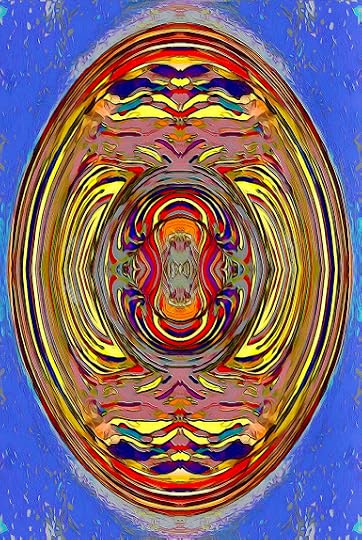 "True patriotism never seeks to advance the well-being of one's own nation at the expense of others. For in the end this would harm one's own nation as well: doing wrong damages both aggressor and victim" (Saint John Paul II, Speech to United Nations, 1995).
"True patriotism never seeks to advance the well-being of one's own nation at the expense of others. For in the end this would harm one's own nation as well: doing wrong damages both aggressor and victim" (Saint John Paul II, Speech to United Nations, 1995).Thirty years later, it is even more clear that nations must collaborate for the well-being of the whole human family and our earthly home... indeed, for the very survival of these. Collaboration, however, cannot be manufactured by a global totalitarian system (note the monstrous failed experiments of the last century). Nor will it come about by the magic of some "invisible hand," as the unsought consequence of nations closing in on themselves, betraying cooperative commitments, and limiting themselves to making transactional "deals" with each other that are inherently unstable and ignore the needs of the rest of the world.
We inhabit local places directly, but we have reached out to wider geographic places by the technological "extensions" of our presence via rapid and facile mobility, enhanced electronic communications, and all the engagements and activities they make possible. We have unprecedented and astonishing possibilities in this 21st century which inevitably involve us in an exponentially bigger "space," drawing us to reach out in exploration toward greater understanding, empathy, and real communicative connection with other persons over great distances.
The human "reach," however, remains limited in the temporal realm, even with all the "extensions" of transportation and communication that make us in some respects "larger" but also carry the danger of misshaping our spatio-temporal ground, distracting and distorting our perception, and over-extending and exhausting our capacities. As bodily persons, we need some kind of locality. The vast majority of us need a strong local foundation for a dignified human life with its proximate physical needs and its engagement with firm integral human relationships.
Fundamentally, there are the relationships that originate from and are generated by our natural bodily persons. This refers to the proper features of our "historical" roots and expression-by-self-giving that move through time in the lineage of our families, wherein we receive the gift of human life and give it to others, thereby "living" an organic bodily-personal "extension" from past-to-present-to-future and collaborating naturally in the intergenerational history of the whole human family. For embodied personal existence, this also entails the gifts and responsibilities of human formation, concrete care, and the most specific forms of love by which as bodily persons we naturally participate in the "movement" of human history.
We all are involved in at least some features of this lineage and the personal bonds built by it (by our origin from our parents, and at least "mediately" through extended family bonds or those very real bonds forged by the profound human "re-generative decision" of adoption). Furthermore, basic human community is facilitated by local, physical proximity that is usually essential for at least the security of fundamental physical needs, but also provides a larger space for interpersonal and communal life constituted by the freedom and creativity of people sharing life together in a given, natural fashion. Human beings are thus "naturally networked," and this is what has inspired us to develop further techniques of "networking" with wider spaces and more distant peoples and activities — by traveling, by hospitality, by study, and by communications media.
 It is essential to our humanity that we continue to have families, communities, nations, and peoples whose own responsibilities and actions must be respected and valued according to the principle of subsidiarity. At the same time, the various spheres of subsidiary action naturally seek to be interconnected and at the service of one another through a conscious and vital solidarity.
It is essential to our humanity that we continue to have families, communities, nations, and peoples whose own responsibilities and actions must be respected and valued according to the principle of subsidiarity. At the same time, the various spheres of subsidiary action naturally seek to be interconnected and at the service of one another through a conscious and vital solidarity. We find ourselves today in a whole world of unprecedented mutual dependence, co-involvement, and — thanks to the ongoing technological revolution — a proximity to one another over distances that can be enriching in many ways but also strange, partial and ephemeral, easily misunderstood, and sometimes invasive or too much to handle. It's easy to lose our balance, our sense of place, and become isolated. We are also caught up more and more in systems we don't understand, and sustained by powers we do not know. We are still limited and ignorant of many things in a world whose interdependence benefits some at the expense of others, with new forms of oppressive poverty, and possibly new reckless experiments of thoughtless plundering of the physical world. These new forms of violence are among the most imminent dangers that threaten all of us in the hyper-powered emergence of this new epoch in human history.
For the whole human family to flourish today and tomorrow, we must grow in the awareness that the earth is the common home of everyone, and that we are all brothers and sisters. We must remember that the physical creation is good, and that it has been entrusted to us to contemplate the wisdom and beauty of its Origin through all the intrinsic, diverse, and interrelated significance of created things (with their mysterious, constitutive, distinctive qualities as signs of the unfathomable Divine omnipotence and gratuitousness).
The world has also been entrusted to the freedom of our creative work to understand and further its vital development — with a freedom informed by wisdom and responsibility, attention, care, and restraint in governing our own ambitions as we develop harmoniously and reap with gratitude the fruits of creative things.
We can only be stewards of creation together, as children of God, as brothers and sisters of His Son who draws all things to Himself by the Holy Spirit. Indeed, this "fraternity" — this communion of persons - is who we are called to be, together.
August 2, 2025
"A Love That Wanted Us..."
"Our existence did not originate from our decision, but from a love that wanted us... a love that precedes us, surprises us and is infinitely greater than us: the love of God" (Pope Leo XIV).

July 31, 2025
Pope Leo's Message to "Digital Missionaries"
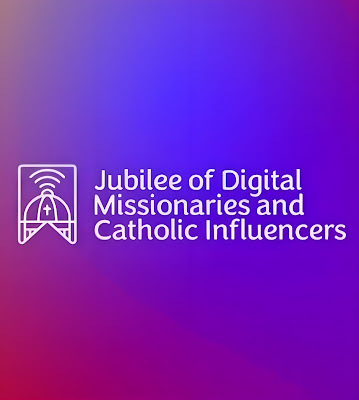 Pope Leo’s message to the Jubilee for Digital Missionaries and Catholic Influencers is not only an extraordinarily rich statement, it also shows that he knows the Internet and recognizes it as a reality with specific possibilities as well as problems and dangers. He encourages us to witness to Jesus in these digital spaces, recognize Him in others, and “nurture a culture of Christian humanism” in these new technological environments as they continue to develop. I want to remember the wisdom and the challenges he sets before us here, so I'm going to post his words for my own reference, and - of course - for anyone else who reads this blog and might benefit from them. Here is a substantial portion of the message of July 29th, courtesy of the Vatican website:
Pope Leo’s message to the Jubilee for Digital Missionaries and Catholic Influencers is not only an extraordinarily rich statement, it also shows that he knows the Internet and recognizes it as a reality with specific possibilities as well as problems and dangers. He encourages us to witness to Jesus in these digital spaces, recognize Him in others, and “nurture a culture of Christian humanism” in these new technological environments as they continue to develop. I want to remember the wisdom and the challenges he sets before us here, so I'm going to post his words for my own reference, and - of course - for anyone else who reads this blog and might benefit from them. Here is a substantial portion of the message of July 29th, courtesy of the Vatican website:1. This is the mission that the Church entrusts to each of you who have come to Rome for your Jubilee. You are here to renew your commitment to nourish Christian hope in social networks and online spaces. Peace needs to be sought, proclaimed, and shared everywhere, both in the places where we see the tragedy of war and in the empty hearts of those who have lost the meaning of life and the desire for introspection and the spiritual life. Perhaps, today more than ever, we need missionary disciples who convey the gift of the Risen Lord to the world; who voice to the ends of the earth the hope that Jesus gives us (cf. Acts 1:3-8); and who go wherever there is a heart that waits, seeks, and is in need. Yes, to the ends of the earth, to the farthest reaches, where there is no hope.
2. There is a second challenge in this mission: always look for the ‘suffering flesh of Christ’ in every brother and sister you encounter online. Today we find ourselves in a new culture, deeply characterized and formed by technology. It is up to us – it is up to each one of you – to ensure that this culture remains human. Science and technology influence the way we live in the world, even affecting how we understand ourselves and how we relate to God, how we relate to one another. But nothing that comes from man and his creativity should be used to undermine the dignity of others. Our mission – your mission – is to nurture a culture of Christian humanism, and to do so together. This is the beauty of the ‘network’ for all of us. Faced with cultural changes throughout history, the Church has never remained passive; she has always sought to illuminate every age with the light and hope of Christ by discerning good from evil and what was good from what needed to be changed, transformed, and purified. Today we are in a culture where the technological dimension is present in almost everything, especially as the widespread adoption of artificial intelligence will mark a new era in the lives of individuals and society as a whole. This is a challenge that we must face: reflecting on the authenticity of our witness, on our ability to listen and speak, and on our capacity to understand and to be understood. We have a duty to work together to develop a way of thinking, to develop a language, of our time, that gives voice to Love. It is not simply a matter of generating content, but of creating an encounter of hearts. This will entail seeking out those who suffer, those who need to know the Lord, so that they may heal their wounds, get back on their feet and find meaning in their lives. Above all, this process begins with accepting our own poverty, letting go of all pretense and recognizing our own inherent need for the Gospel. And this process is a communal endeavor.
3. This brings us to the third invitation in this mission, which I extend to all of you: ‘go and mend the nets.’ Jesus called his first apostles while they were mending their fishing nets (cf. Mt 4:21-22). He asks the same of us today. Indeed, he asks us to weave other nets: networks of relationships, of love, of gratuitous sharing where friendship is profound and authentic; networks where we can mend what has been broken, heal from loneliness, not focus on the number of followers, but experience the greatness of infinite Love in every encounter; networks that give space to others more than to ourselves, where no ‘bubble’ can silence the voices of the weakest; networks that liberate and save; networks that help us rediscover the beauty of looking into each other’s eyes; networks of truth. In this way, every story of shared goodness will be a knot in a single, immense network: the network of networks, the network of God. Be agents of communion, capable of breaking down the logic of division and polarization, of individualism and egocentrism. Centre yourselves on Christ, so as to overcome the logic of the world, of fake news, of frivolity, with the beauty and light of Truth (cf. Jn 8:31-32).
Before concluding with a blessing and commending your witness to the Lord, I would like to thank you for all the good you have done and continue to do in your lives: for pursuing your dreams, for your love for the Lord Jesus and your love for the Church, for the help you give to those who suffer, and for your journey along the virtual highways.
Copyright © Dicastero per la Comunicazione - Libreria Editrice Vaticana
July 30, 2025
Freedom From “The Grasp of the Powers-That-Be”
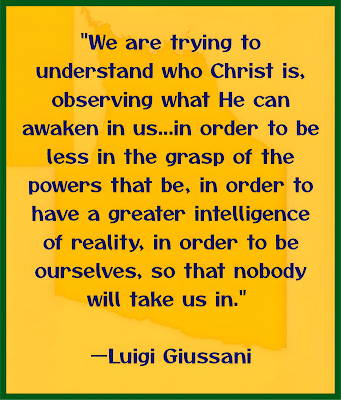 I am continually learning the truth that Father Giussani always emphasized about the concrete meaning and fulfillment of our existence. We discover our true freedom and identity in belonging to Jesus Christ, through whom we become children of the Father in the Spirit, and are raised up to a participation in the eternal life of the Triune God who is Infinite Love. This is the destiny for which each one of us was created. Either we live in the freedom of relationship with the God who gives Himself to us, or we live as slaves of dehumanizing idols shaped by the powers who aspire to be the masters of this world.
I am continually learning the truth that Father Giussani always emphasized about the concrete meaning and fulfillment of our existence. We discover our true freedom and identity in belonging to Jesus Christ, through whom we become children of the Father in the Spirit, and are raised up to a participation in the eternal life of the Triune God who is Infinite Love. This is the destiny for which each one of us was created. Either we live in the freedom of relationship with the God who gives Himself to us, or we live as slaves of dehumanizing idols shaped by the powers who aspire to be the masters of this world.Following Christ awakens us to a greater intelligence of reality and this also empowers us to become our true selves. Christ enables us to be free from the lies, distortions, and manipulation imposed by those who hold power — those who seek to impoverish our humanity and do violence to the dignity of our integral human vocation.
July 29, 2025
The Friend of Martha, Mary, and Lazarus
 Today we celebrate the Feast of Saint Martha of Bethany along with her sister Saint Mary of Bethany and their brother Saint Lazarus (the latter two were recently added to Martha's feast, as all three were disciples and friends of Jesus who have distinct roles in the Gospel). We often hear the story of Martha's "anxiousness in the kitchen," but the culmination of her relationship with Jesus is manifested in a powerful way in the days following the death of her brother.
Today we celebrate the Feast of Saint Martha of Bethany along with her sister Saint Mary of Bethany and their brother Saint Lazarus (the latter two were recently added to Martha's feast, as all three were disciples and friends of Jesus who have distinct roles in the Gospel). We often hear the story of Martha's "anxiousness in the kitchen," but the culmination of her relationship with Jesus is manifested in a powerful way in the days following the death of her brother.After Lazarus died, many people came to Martha and Mary to mourn with them. Jesus had waited until this time to go to the household of these dear friends in Bethany, whom he loved with a deep human affection. The surrounding people knew that Martha, Mary, and Lazarus were dear to Jesus, and wondered why he had not come sooner and healed Lazarus of his illness. Martha and Mary themselves carried this question within their hearts, but continued to hope in Jesus.
In this great Gospel text of John 11, Martha is led to a deeper faith; she is given the grace to recognize and confess that Jesus is the Messiah, the Son of God, the Savior. When Jesus reveals himself to her as "the Resurrection and the Life," he addresses Martha's freedom: "Do you believe this?" When Martha says "Yes," she moves beyond her view of Jesus as a prophet within the context of Israel's hope for "the Last Day." Like Peter in Matthew 16, Martha expresses a new kind of faith in the presence of Jesus in her immediate history, that he is the Messiah, the hope of Israel and the world, the hope of victory over death itself:
"When Martha heard that Jesus was coming, she went to meet him; but Mary sat at home. Martha said to Jesus, 'Lord, if you had been here, my brother would not have died. But even now I know that whatever you ask of God, God will give you.' Jesus said to her, 'Your brother will rise.' Martha said to him, 'I know he will rise, in the resurrection on the last day.' Jesus told her, 'I am the resurrection and the life; whoever believes in me, even if he dies, will live, and anyone who lives and believes in me will never die. Do you believe this?' She said to him, 'Yes, Lord. I have come to believe that you are the Christ, the Son of God, the one who is coming into the world.' " (John 11:19-27).
July 28, 2025
“Let Us Not Cease to Pray…”
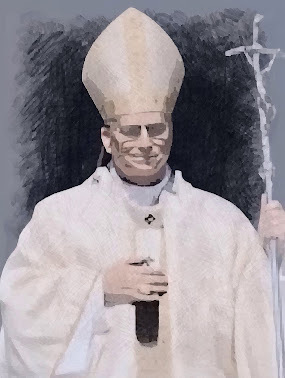 "The Lord always listens to us when we pray to him. If he sometimes responds in ways or at times that are difficult to understand, it is because he acts with wisdom and providence, which are beyond our understanding. Even in these moments, then, let us not cease to pray — and pray with confidence — for in him we will always find light and strength" (Pope Leo XIV).
"The Lord always listens to us when we pray to him. If he sometimes responds in ways or at times that are difficult to understand, it is because he acts with wisdom and providence, which are beyond our understanding. Even in these moments, then, let us not cease to pray — and pray with confidence — for in him we will always find light and strength" (Pope Leo XIV).




